
When Women Lead: A Groundbreaking Look at Bias, Leadership and the Future of Work with CNBC’s Julia Boorstin
The deck is still stacked against women in the workplace. Learn how some women dramatically defy the odds, and what both men and women can learn from them to succeed. Don’t miss this eye-opening conversation with CNBC Senior Correspondent Julia Boorstin.

The Exponential Age: How Accelerating Technology is Transforming Business, Politics and Society with Tech Seer Azeem Azhar
Technology is advancing at exponential speed, and humanity is having serious trouble keeping up. Azeem Azhar, a tech seer who has founded and sold four companies, shares his unique insights into what he calls the “exponential gap” and its impact on business and society.
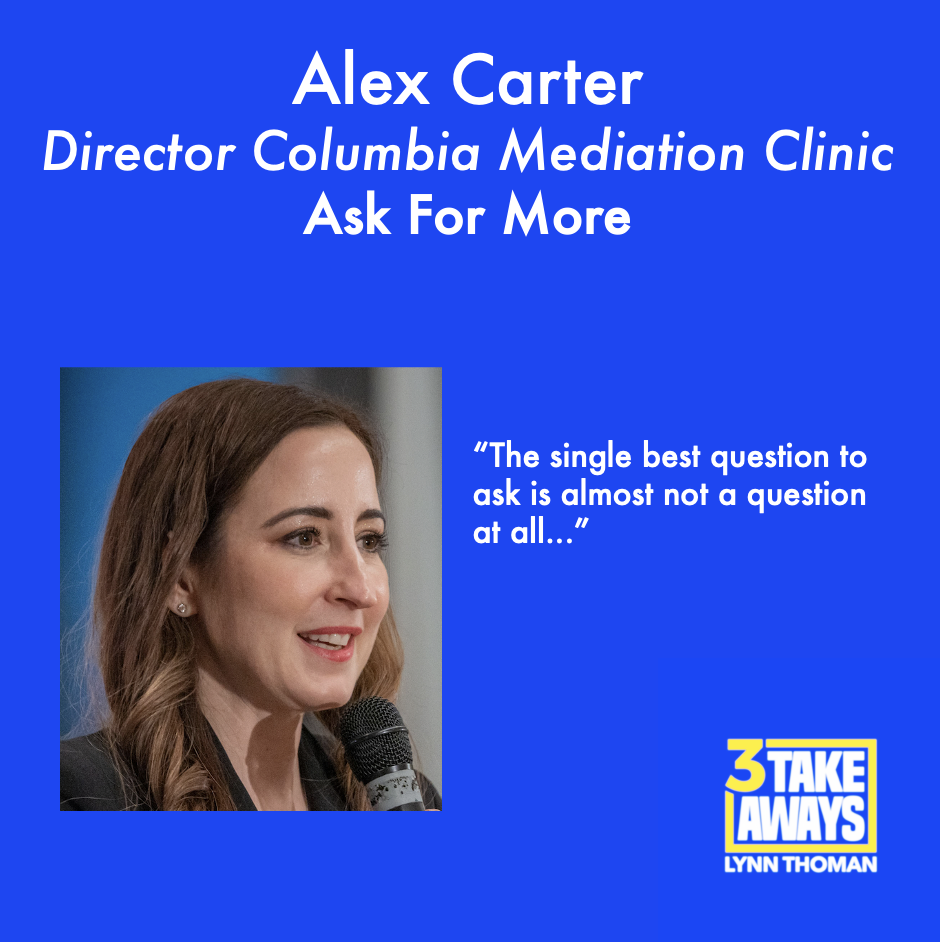
Ask For More: 2 Questions to Negotiate Almost Anything with Columbia Law School Mediation Clinic Director Alex Carter
Did you know that by asking better questions, you get better answers and better results from negotiations, as well as conversations? Learn what the 2 best questions are, and why these 2 questions work almost magically in negotiations as well as in conversations - including those with spouses, children, and colleagues.
Negotiation is not a zero-sum game. It’s an essential skill for your career that can also improve your closest relationships and your everyday life.
Alex Carter is Director of Columbia Law School’s Mediation Clinic. Her Wall Street Journal bestselling book is Ask For More.

Former FCC Chair Tom Wheeler: Our Loss of Privacy Is Worse Than You Think, No Matter What You Think
Your entire life is an open book of information collected by tech companies. According to Tom Wheeler, former head of the Federal Communications Commission, the privacy problem is shockingly large, getting bigger, and has frightening consequences. What, if anything, can be done? Listen and find out.

Unconscious Bias is Real, So Are the Solutions: Harvard Kennedy School Former Academic Dean Iris Bohnet
How can we reduce or neutralize unconscious bias? It’s a critical question these days – especially with DEI in mind – answered by an expert: Iris Bohnet, the former Academic Dean of the Kennedy School and co-Director of the Women and Public Policy Program. She calls it “unfreezing” our minds, and offers some surprisingly simple solutions.
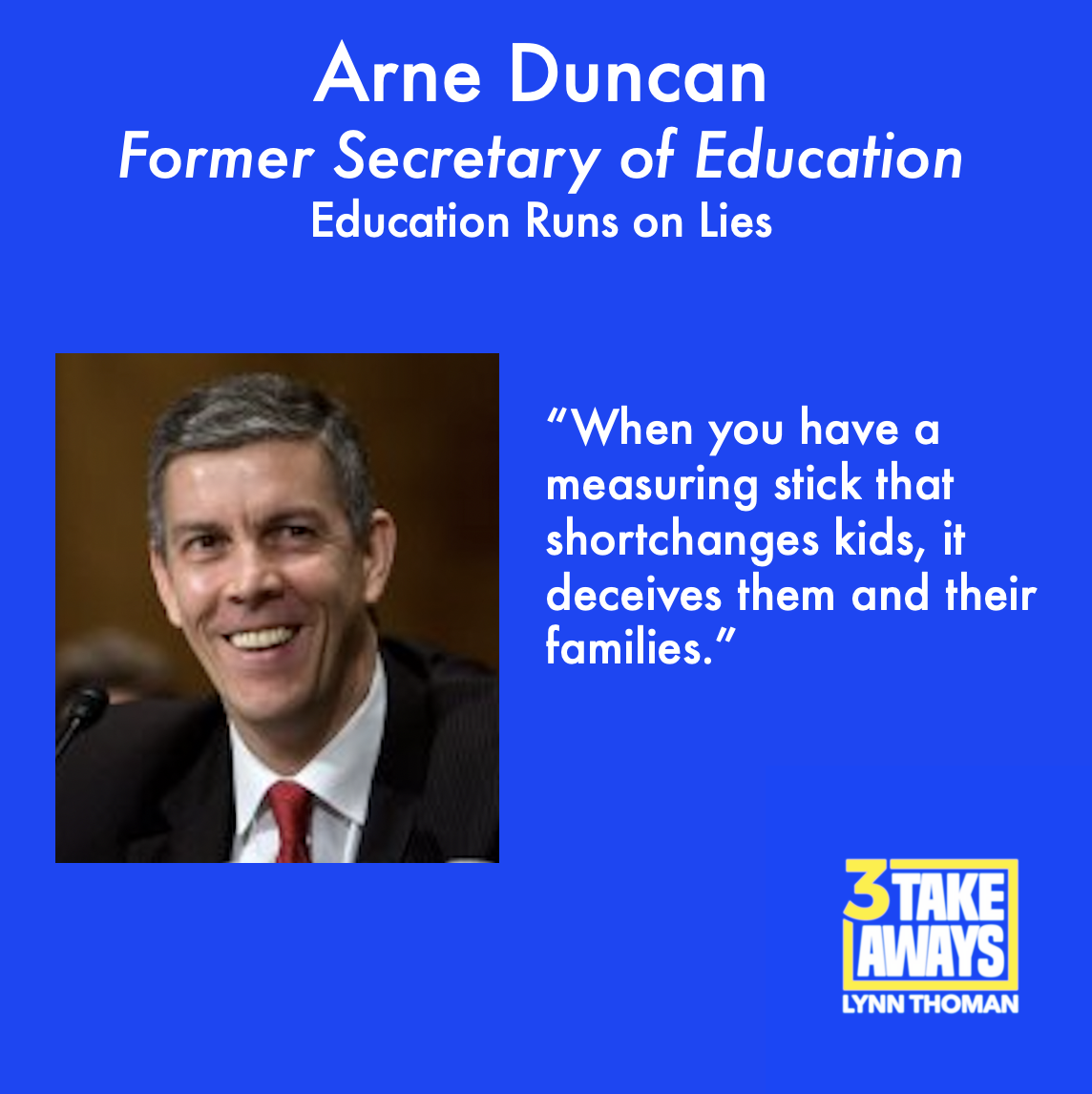
Former Secretary of Education Arne Duncan: Education Runs on Lies
“Education runs on lies. That’s probably not what you’d expect from a former Secretary of Education, but it’s the truth.” Arne Duncan exposes the lies and the broken system that have caused American kids to fall behind. He also shares what really works.

Why We Laugh: The Many Shapes and Forms of Laughter with Neuroscientist Sophie Scott
Laughter, it turns out, is not primarily a response to humor. Neuroscientist Sophie Scott CBE shares why we laugh, how it works and the many sins it covers.
We explore how laughter bonds us, where it breaks us, and the ways we use it. We should all bring a greater sense of understanding and intention to our laughter. Sophie Scott is a neuroscientist and professor at UCL whose research focuses on the science of laughter.

How We Can Defeat The Next Pandemic and The Future of Medicine: Dr. Eric Topol
Dr. Eric Topol explains how we can prepare for the next pandemic, including having stockpiles of variant proof vaccines for the families that are most likely to cause pandemics besides coronavirus and influenza. He also shares recent breakthroughs in medicine which will improve accuracy and diagnosis.
Dr. Topol is the founder of Scripps Research.
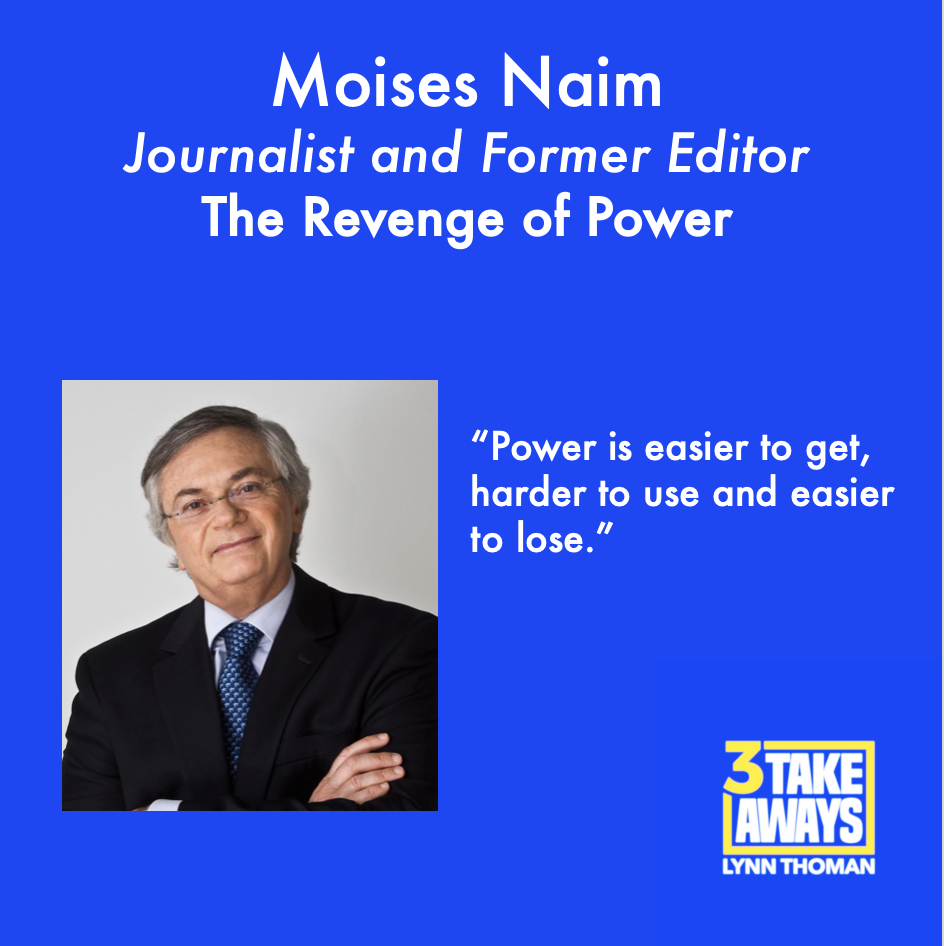
The Revenge of Power: How Power is Shifting in the 21st Century with Moises Naim
Power is easier to get, harder to use and easier to lose. Moises Naim explores how power is changing across all sectors of society. Power has shifted from country leaders to public squares, large companies to start-ups, and large armies to insurgents. Being in charge isn’t what it used to be! But at the same time, power is also concentrating in some sectors. Autocrats are reinventing politics and gaining power using 21st century tools - populism, polarization and post-truths - and undermining democracies around the world.
Moises Naim is a Venezuelan journalist and former editor-in-chief of Foreign Policy magazine. He was Minister of Trade and Industry for Venezuela, director of Venezuela’s Central Bank, and executive director of the World Bank. He is the author of The End of Power and The Revenge of Power.
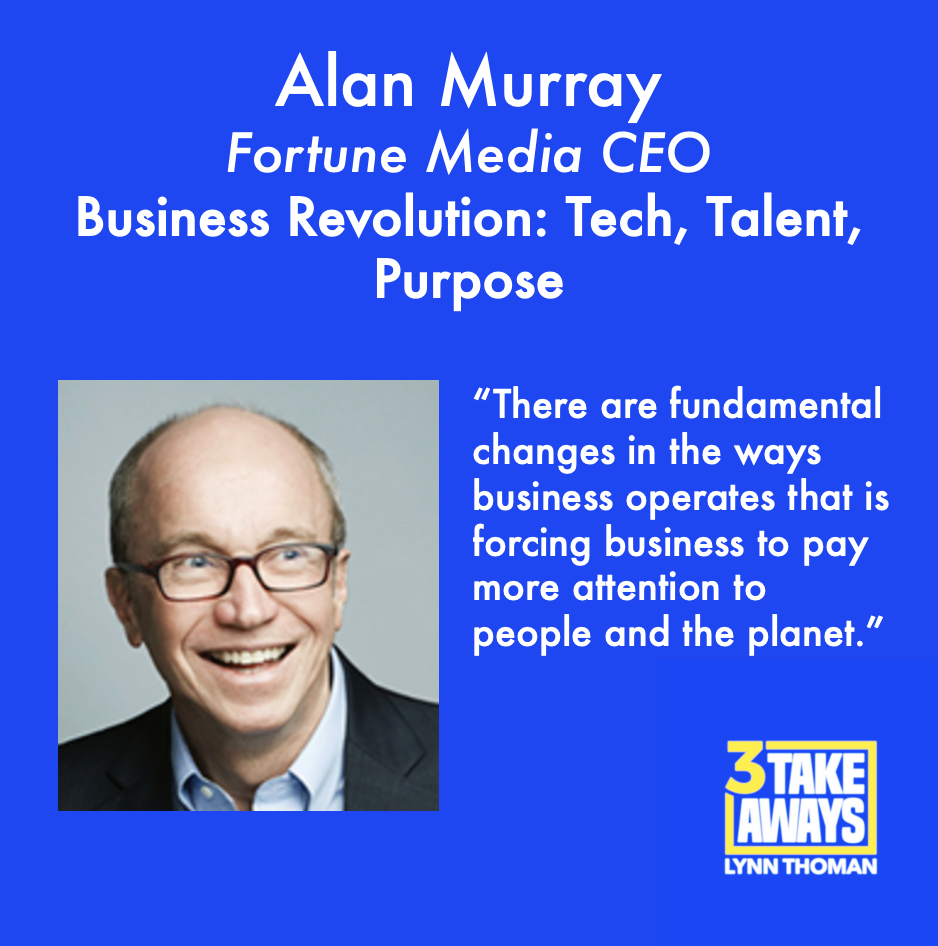
Business Revolution: Tech, Talent, Purpose with Fortune Media CEO Alan Murray
Fortune Media CEO Alan Murray shares the dramatic changes in business today due to the tech revolution, which is disrupting so many businesses, and the purpose revolution which is causing companies to re-think what they should be doing.
He believes that fundamental changes in the ways businesses operate today are forcing them to pay more attention to people and the planet.
It used to be that 80% of the value of the Fortune 500 came from physical assets but now over 85% of the value is intangible assets including intellectual property, software, brand value and the human emotional connection that comes from brand value. Since intangibles, which is where the value lies today, are things that are much more closely tied to people - it's human ingenuity that creates the intellectual property, it's human emotion that creates the brand value and the brand connection - business leaders are paying much more attention to people. Alan shares how that is changing the purpose of corporations and the role of the CEO today.
He also talks about how business has changed due to the pandemic, remote work, Black Lives Matter, rising inequality, global warming and the Ukraine Russia war.
Unless businesses are responsive to their employees, their customers and their communities, Alan believes they will lose. The biggest changes, he says, are yet to come.
His new book is Tomorrow’s Capitalist.

World Famous Architect Robert A.M. Stern on Architecture and Design: What Makes His Buildings Special?
Robert A.M. Stern, who designs the most sought after buildings in the world, shares how he sees architecture and design, and what makes his buildings so special that they regularly set records for the highest price per square foot, even when they're not in the best neighborhoods.
He explains how his buildings are informed by the past but situated in the future, how he sees detail and ornament as the grace notes of architecture, and how he favors second glance architecture, as opposed to “screamers”. The new J.P. Morgan building going up in New York City, he says, is “a screamer on Park Avenue and [may] be the final death of that once noble and coherent boulevard.” He also shares what and why he wants “to connect” and how making a building is a symphony.
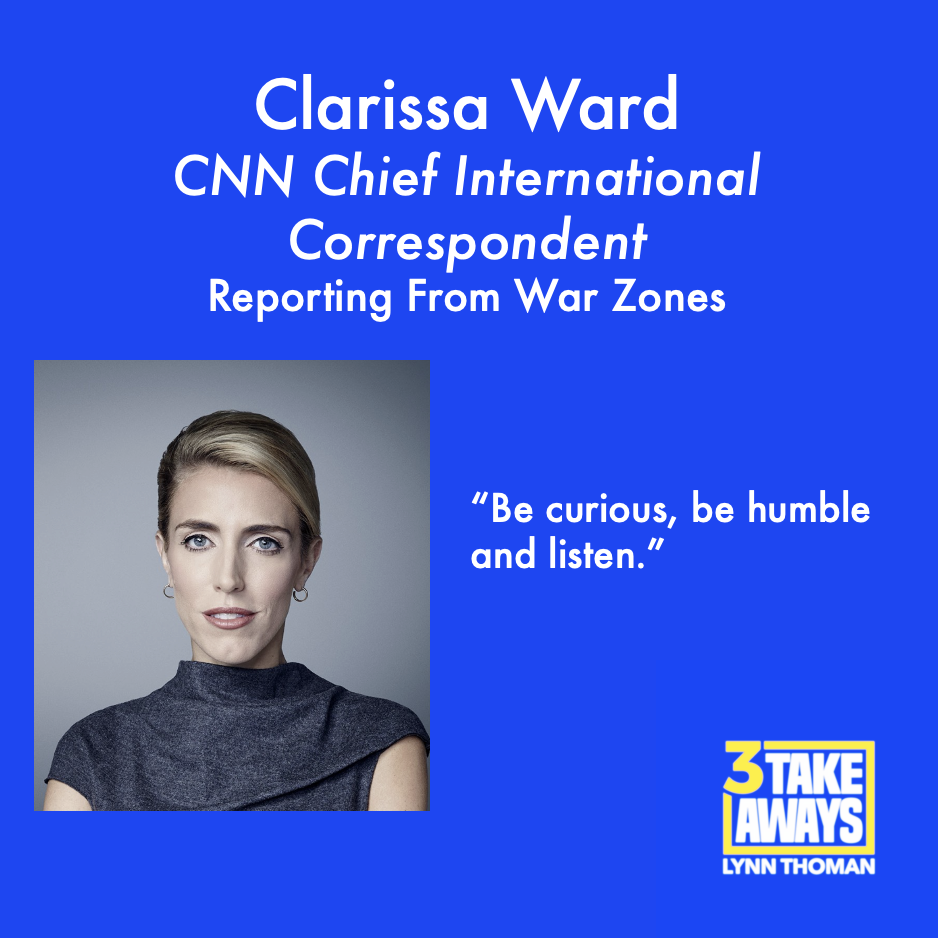
Reporting from War Zones with CNN Chief International Correspondent Clarissa Ward: How What's Reported Differs From the Situation On the Ground
This week we talk with Clarissa Ward, CNN’s Chief International Correspondent, who has been reporting from Ukraine, and who has covered hot zones and wars in Lebanon, Iraq, Egypt, Syria and Afghanistan and been based in Baghdad, Beirut, Beijing and Moscow. She shares the remaking of the world from the front lines and how the situation on the ground differs from what’s reported.
She provides a deeply personal and inside scoop on the news. Find out why TV doesn’t provide a full picture of reality and what she’s learned from her extensive time covering conflicts and wars.
She also talks about a reporter’s responsibility in being a vessel, the mental health toll of reporting from war zones and the surprising advantages to being a woman reporting from the Middle East.
Clarissa is known for her courage, compassion and riveting reporting. She speaks seven languages and has received multiple awards, including Peabody, Murrow and nine Emmy awards.

The Secret Life of Words - What Our Words Say About Us and What We Can Learn From Other’s Words: Jamie Pennebaker
Ever wondered if we could predict people’s actions through their words? Renowned social psychologist and linguist Dr Jamie Pennebaker shares how words can give away our secrets, feelings and inner state of mind from Putin’s language which predicted his invasion of Ukraine to poets whose use of the word “I” can predict a higher risk of suicide.
Dr. Pennebaker’s groundbreaking research in computational linguistics analyzing and counting the frequency of words, shows that our most forgettable words, such as pronouns I, me and my, can be the most revealing.
He explains what the words Vladimir Putin, Xi Jinping, and Joe Biden use (and even the ones they don’t use) reveal about their inner feelings and the “tell” that predicted Vladimir Putin’s invasion of Ukraine.
He also talks about how American Presidents have become more likeable and less analytical, the differences in men’s and women's words, and how writing about traumatic experiences can help people heal and improve their physical health.
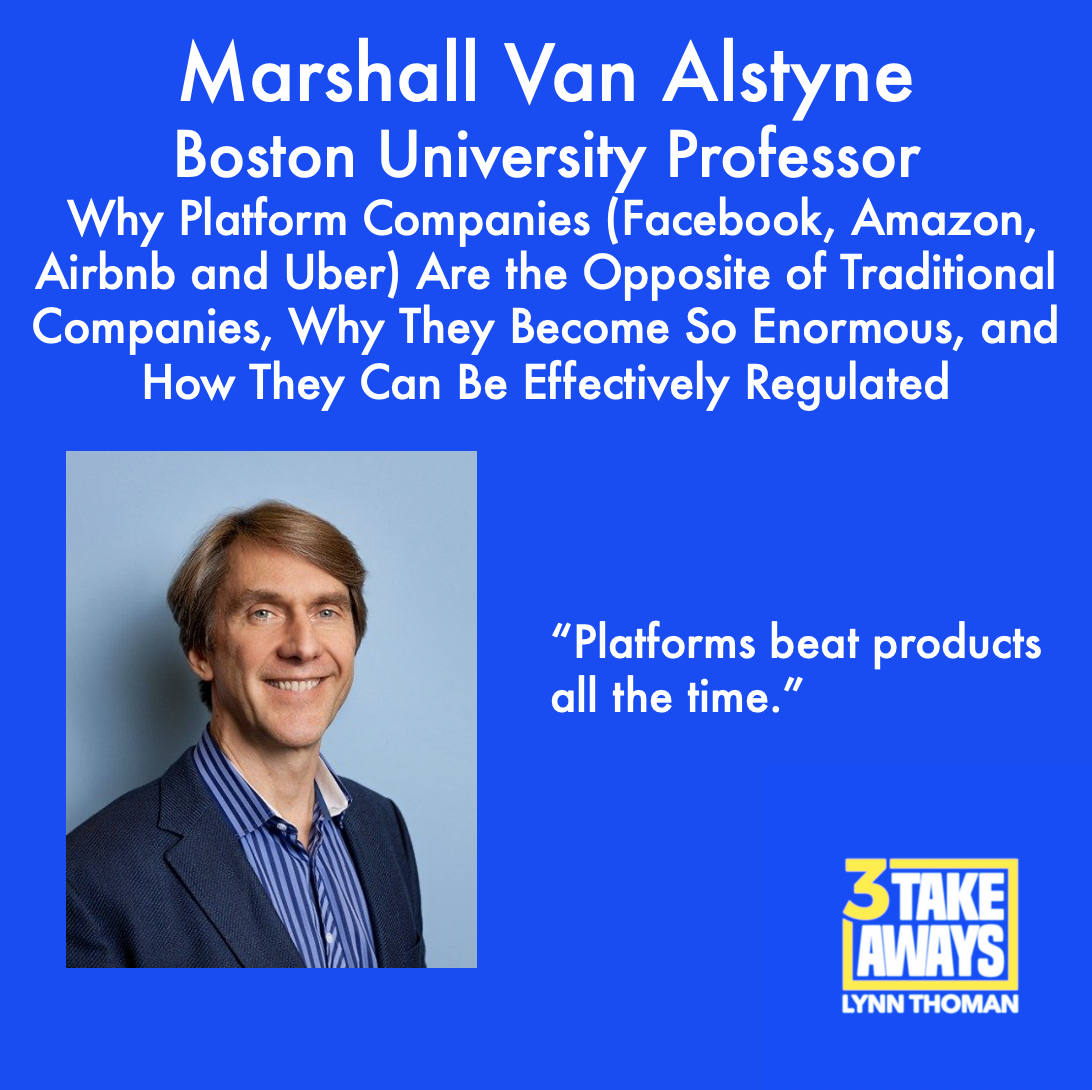
Why Platform Companies (Facebook, Amazon, Airbnb and Uber) Are the Opposite of Traditional Companies, Why They Become So Enormous, and How They Can Be Effectively Regulated: Marshall Van Alstyne
Marshall Van Alstyne shares why platform companies dominate traditional businesses and why 7 of the 10 largest companies in the world are platform companies. Learn how they outcompete traditional companies while employing just a tiny fraction of the number of people, how they are completely different from companies of the past, and why platforms beat products all the time.
Boston University professor Marshall Van Alstyne is the co-author of the international bestseller Platform Revolution and he is one of the world's experts on network business models.

Is Tribalism Always Bad? How Group Identity or Tribalism Has Taken Over our Political System with Yale Law School Professor Amy Chua
Yale Law School professor Amy Chua shares how group identity has caused bitter partisanship in the U.S. and the failure of U.S. policies in Vietnam and other countries. Learn how children as young as 4 years old identify with groups and consistently display systematic, unconscious bias toward other groups. Amy argues that tribalism has taken over America's political system and that the way forward lies in remembering what makes the country special.
Amy Chua is the author of 5 books and was named one of Time magazine’s 100 Most Influential People.
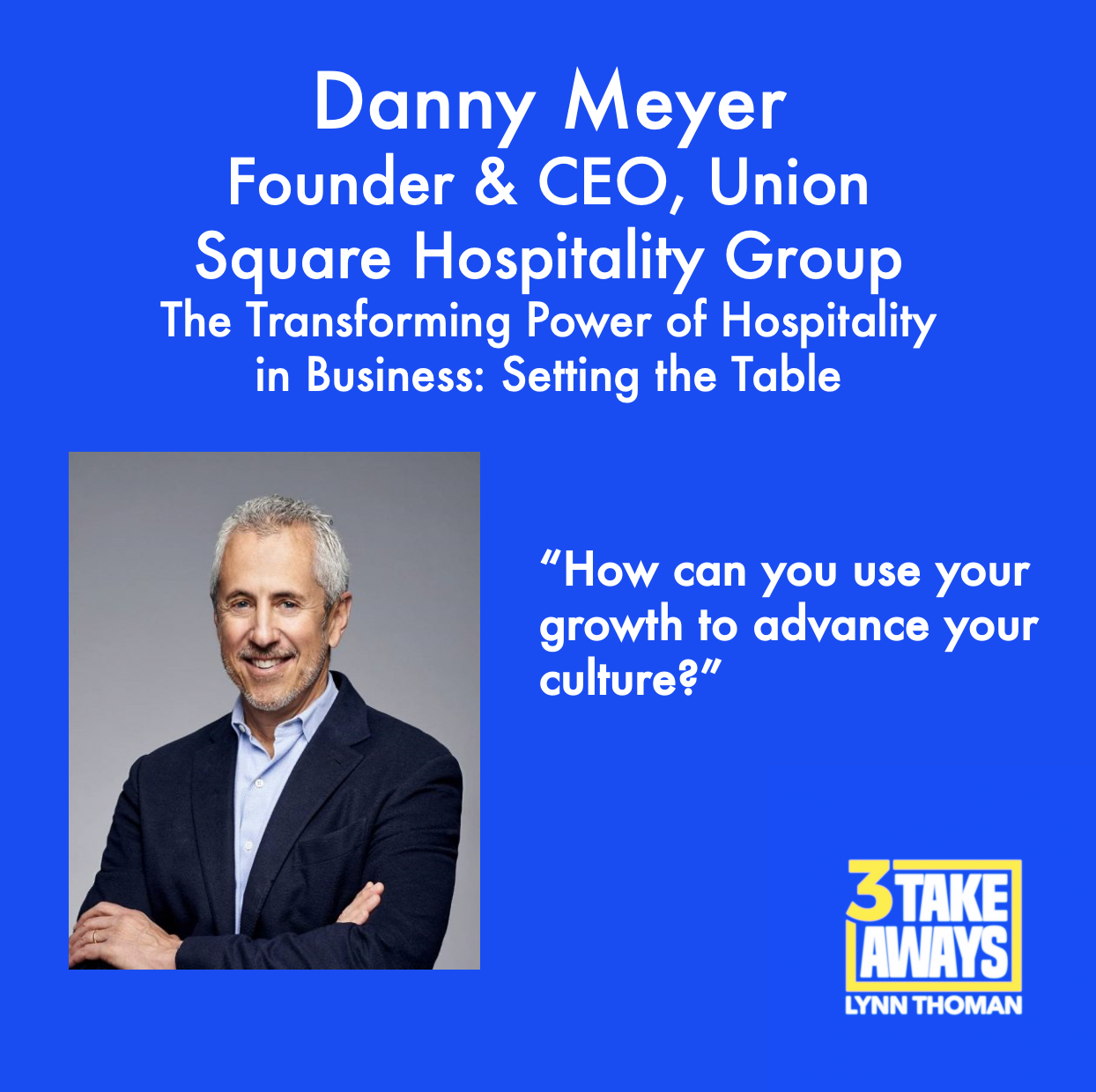
The Transforming Power of Hospitality in Business: Setting the Table with Union Square Hospitality Group Founder & CEO Danny Meyer
Danny Meyer shares how to deliver outstanding hospitality, how he thinks restaurants will be different post pandemic and what continues to get him excited each day.
Danny is the founder and CEO of Union Square Hospitality Group, which comprises some of New York’s most beloved and acclaimed restaurants, including Gramercy Tavern, Shake Shack, The Modern, Maialino, and many more.
Danny and USHG’s restaurants have won an unprecedented 28 James Beard Awards, including Outstanding Restaurateur, several three Michelin stars, and a Julia Child Award. He has also been recognized by Who’s Who of Food and Beverage in America and TIME 100 “Most Influential People”.
”You may think, as I once did, that I’m primarily in the business of serving good food. Actually, though, food is secondary to something that matters even more. In the end, what’s most meaningful is creating positive, uplifting outcomes for human experiences and human relationships. Business, like life, is all about how you make people feel. It’s that simple, and it’s that hard.”
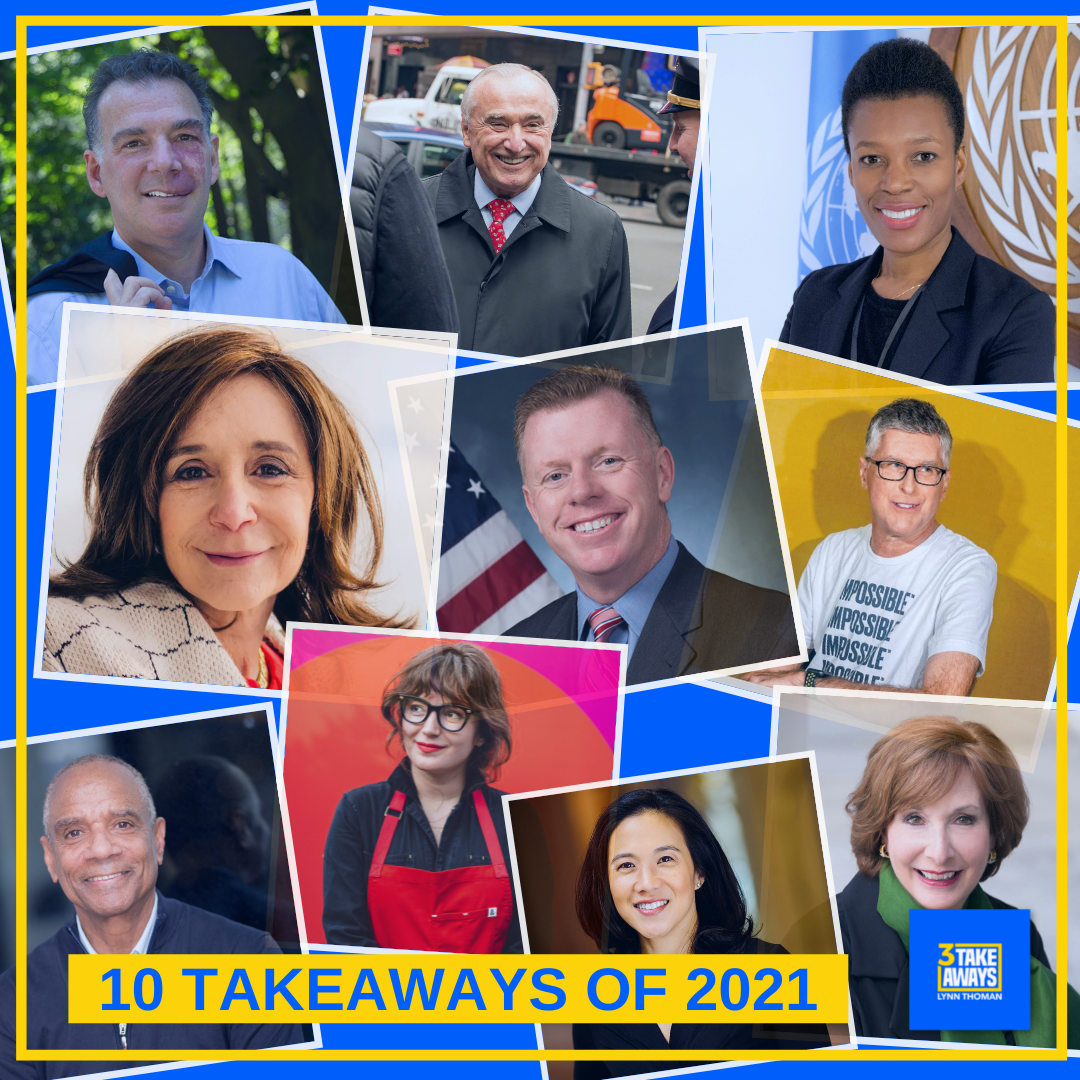
Always Be Learning: The Top 10 Takeaways of 2021 From Our Guests
This week on the podcast we are highlighting the Top 10 Takeaways of 2021. With guests ranging from CEOs and founders, to best-selling authors and even the Director of the U.S. Secret Service. These individuals left us feeling motivated and inspired!
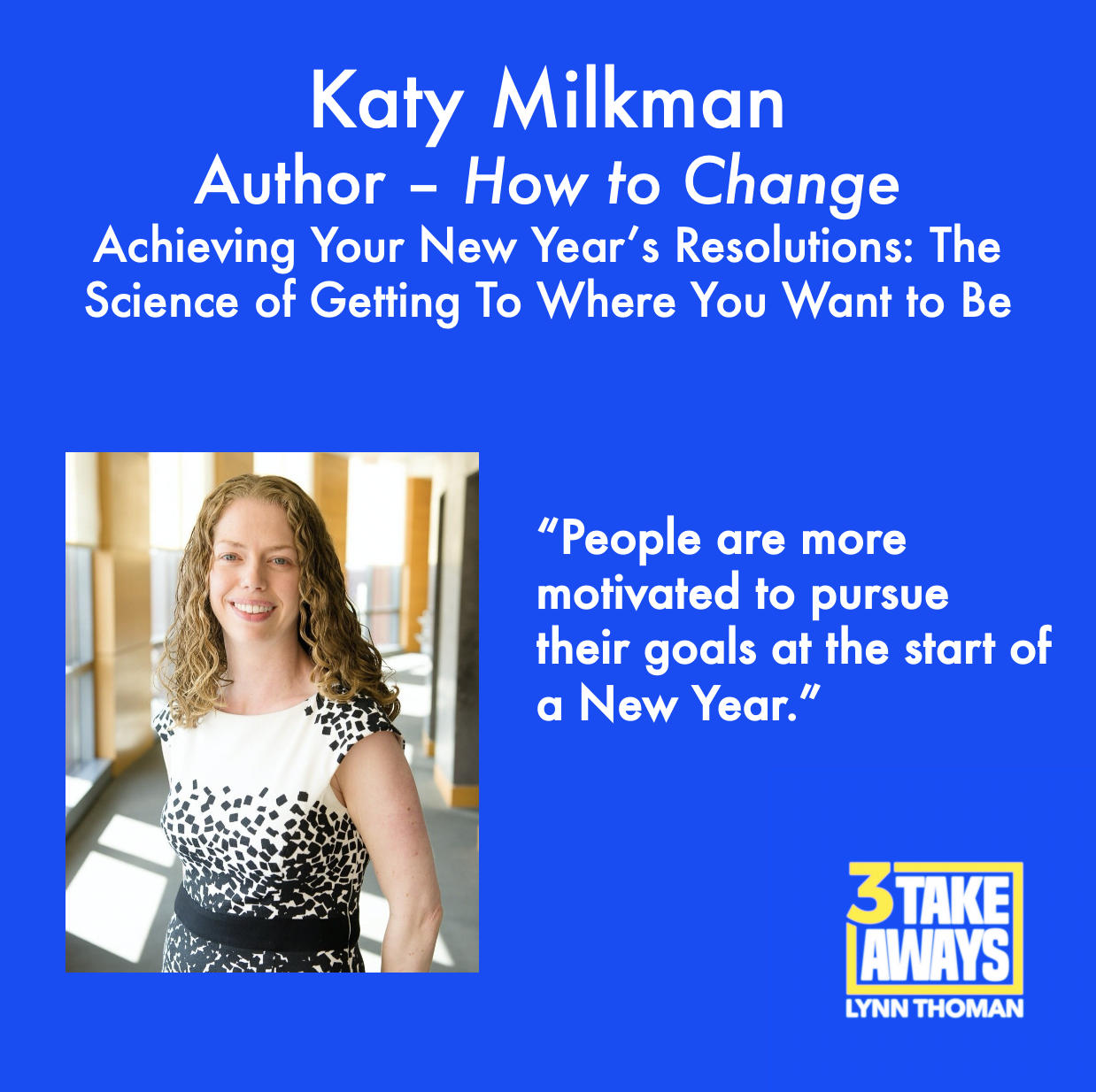
Achieving Your New Year’s Resolutions: The Science of Getting To Where You Want to Be with Katy Milkman (Repost)
Wall Street Journal best-selling author Katy Milkman shares science-based ways to create change in our lives. Learn how to understand your impulses and make them work for you, rather than against you.
Katy is an advisor on how to spur positive change and has advised organizations from Google to the Red Cross. She is a professor at the Wharton School at the University of Pennsylvania and the best-selling author of How to Change: The Science of Getting From Where You Are to Where You Want to Be.

Harvard Professor, Robert Waldinger: What the Good Life Actually Looks Like Based on Harvard’s 75 Year Study
Find out what the good life actually looks like based on Harvard's 75-year study of more than 700 men from when they were teenagers through old age, with the director of the study, Robert Waldinger. Learn the single most important thing that keeps us healthy and happy as we go through life and what predicts who will stay healthy and live longer.
To learn more about Robert Waldinger and the Harvard Study of Adult Development, visit https://robertwaldinger.com.

Army General (Ret.) Stanley McChrystal: "The Greatest Risk Is Us" - So What is the Solution?
Former Commander of Afghanistan General (Ret.) Stanley McChrystal shares lessons from Afghanistan, the impact of the withdrawal, what makes a great leader and what he is most proud of in his career. Former Defense Secretary Robert Gates has described General McChrystal as, "Perhaps the finest warrior and leader of men in combat I have ever met." Learn what General McChrystal believes to be the biggest risk facing the U.S. and the solution.
Gen. McChrystal rose to four-star general in the U.S. Army and Commander of both the International Security Assistance Force and Commander of the U.S. Forces in Afghanistan. He previously served as Director of the Joint Staff and as Commander of the Joint Special Operations Command.
He is the author of several books, including Leaders and Risk, and is currently a senior fellow at Yale University's Jackson Institute for Global Affairs and co-founder of the McChrystal Group, a leadership consulting firm.
